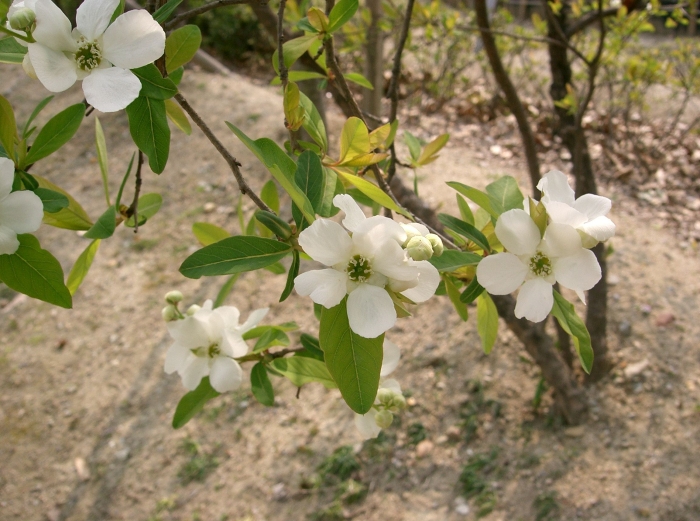Common Pearlbush
(Exochorda racemosa)
Common Pearlbush (Exochorda racemosa)
/
/

KENPEI
CC BY-SA 3.0
Image By:
KENPEI
Recorded By:
Copyright:
CC BY-SA 3.0
Copyright Notice:
Photo by: KENPEI | License Type: CC BY-SA 3.0 | License URL: http://creativecommons.org/licenses/by-sa/3.0/ | Uploader: KENPEI | Publisher: Wikimedia Commons | Title: Exochorda_racemosa1.jpg | Notes: |























Estimated Native Range
Summary
Exochorda racemosa, commonly known as Common Pearlbush, is a deciduous shrub native to open woodlands and forest edges in Asia-Temperate regions, particularly in China. It typically grows to a height of 4-8 feet (1.2-2.4 meters) and a similar width, with a loose, irregular or vase-shaped and upright form. The plant is renowned for its spectacular spring bloom, featuring clusters of white flowers that resemble pearls before they open, hence the name "Pearlbush." These flowers, about 4 cm (1.6 in) in diameter, have round petals and are borne in racemes with groups of six to ten, flowering from late April to early May. Following the flowering season, flowers give way to brown, dehiscent seed capsules which are less ornamental.
Common Pearlbush is valued for its showy spring flowers and is often used in garden borders, as a specimen plant, or in mass plantings for a dramatic effect. It thrives in full sun to part shade and prefers well-drained soils with medium moisture. While it is relatively low-maintenance, occasional pruning after flowering helps maintain its shape and promotes vigorous growth. Gardeners should be aware that Exochorda racemosa can be invasive in some regions when grown outside its native range, so it is important to check local guidelines before planting.CC BY-SA 4.0
Common Pearlbush is valued for its showy spring flowers and is often used in garden borders, as a specimen plant, or in mass plantings for a dramatic effect. It thrives in full sun to part shade and prefers well-drained soils with medium moisture. While it is relatively low-maintenance, occasional pruning after flowering helps maintain its shape and promotes vigorous growth. Gardeners should be aware that Exochorda racemosa can be invasive in some regions when grown outside its native range, so it is important to check local guidelines before planting.CC BY-SA 4.0
Plant Description
- Plant Type: Shrub
- Height: 10-15 feet
- Width: 10-15 feet
- Growth Rate: Moderate
- Flower Color: White
- Flowering Season: Spring
- Leaf Retention: Deciduous
Growth Requirements
- Sun: Full Sun, Part Shade
- Water: Medium
- Drainage: Medium
Common Uses
Border Plant, Low Maintenance, Showy Flowers, Street Planting
Natural Habitat
native to open woodlands and forest edges in Asia-Temperate regions, particularly in China
Other Names
Common Names: Pearlbush, Common Pearlbush, Exochorde En Grappes, Pärlbuske, Bai Jian Mei
Scientific Names: , Exochorda racemosa, Exochorda korolkowii, Exochorda racemosa subsp. racemosa, Exochorda grandiflora, Exochorda alberti, Exochorda tianschanica, Exochorda racemosa var. dentata, Spiraea grandiflora, Albertia simplicifolia
GBIF Accepted Name: Exochorda racemosa (Lindl.) Rehder